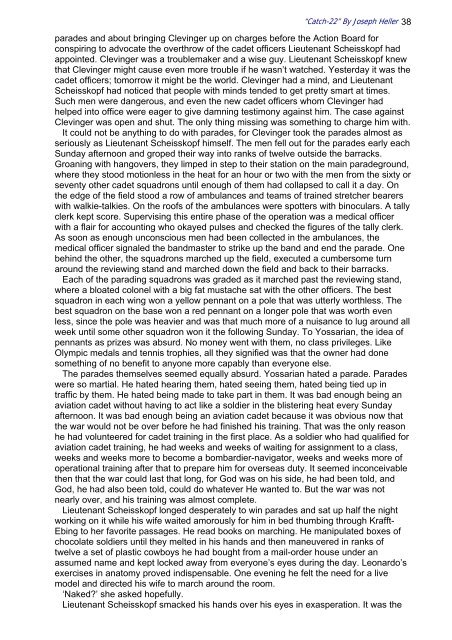Create successful ePaper yourself
Turn your PDF publications into a flip-book with our unique Google optimized e-Paper software.
“Catch-22” <strong>By</strong> <strong>Joseph</strong> Heller 38<br />
parades and about bringing Clevinger up on charges before the Action Board for<br />
conspiring to advocate the overthrow of the cadet officers Lieutenant Scheisskopf had<br />
appointed. Clevinger was a troublemaker and a wise guy. Lieutenant Scheisskopf knew<br />
that Clevinger might cause even more trouble if he wasn’t watched. Yesterday it was the<br />
cadet officers; tomorrow it might be the world. Clevinger had a mind, and Lieutenant<br />
Scheisskopf had noticed that people with minds tended to get pretty smart at times.<br />
Such men were dangerous, and even the new cadet officers whom Clevinger had<br />
helped into office were eager to give damning testimony against him. The case against<br />
Clevinger was open and shut. The only thing missing was something to charge him with.<br />
It could not be anything to do with parades, for Clevinger took the parades almost as<br />
seriously as Lieutenant Scheisskopf himself. The men fell out for the parades early each<br />
Sunday afternoon and groped their way into ranks of twelve outside the barracks.<br />
Groaning with hangovers, they limped in step to their station on the main paradeground,<br />
where they stood motionless in the heat for an hour or two with the men from the sixty or<br />
seventy other cadet squadrons until enough of them had collapsed to call it a day. On<br />
the edge of the field stood a row of ambulances and teams of trained stretcher bearers<br />
with walkie-talkies. On the roofs of the ambulances were spotters with binoculars. A tally<br />
clerk kept score. Supervising this entire phase of the operation was a medical officer<br />
with a flair for accounting who okayed pulses and checked the figures of the tally clerk.<br />
As soon as enough unconscious men had been collected in the ambulances, the<br />
medical officer signaled the bandmaster to strike up the band and end the parade. One<br />
behind the other, the squadrons marched up the field, executed a cumbersome turn<br />
around the reviewing stand and marched down the field and back to their barracks.<br />
Each of the parading squadrons was graded as it marched past the reviewing stand,<br />
where a bloated colonel with a big fat mustache sat with the other officers. The best<br />
squadron in each wing won a yellow pennant on a pole that was utterly worthless. The<br />
best squadron on the base won a red pennant on a longer pole that was worth even<br />
less, since the pole was heavier and was that much more of a nuisance to lug around all<br />
week until some other squadron won it the following Sunday. To Yossarian, the idea of<br />
pennants as prizes was absurd. No money went with them, no class privileges. Like<br />
Olympic medals and tennis trophies, all they signified was that the owner had done<br />
something of no benefit to anyone more capably than everyone else.<br />
The parades themselves seemed equally absurd. Yossarian hated a parade. Parades<br />
were so martial. He hated hearing them, hated seeing them, hated being tied up in<br />
traffic by them. He hated being made to take part in them. It was bad enough being an<br />
aviation cadet without having to act like a soldier in the blistering heat every Sunday<br />
afternoon. It was bad enough being an aviation cadet because it was obvious now that<br />
the war would not be over before he had finished his training. That was the only reason<br />
he had volunteered for cadet training in the first place. As a soldier who had qualified for<br />
aviation cadet training, he had weeks and weeks of waiting for assignment to a class,<br />
weeks and weeks more to become a bombardier-navigator, weeks and weeks more of<br />
operational training after that to prepare him for overseas duty. It seemed inconceivable<br />
then that the war could last that long, for God was on his side, he had been told, and<br />
God, he had also been told, could do whatever He wanted to. But the war was not<br />
nearly over, and his training was almost complete.<br />
Lieutenant Scheisskopf longed desperately to win parades and sat up half the night<br />
working on it while his wife waited amorously for him in bed thumbing through Krafft-<br />
Ebing to her favorite passages. He read books on marching. He manipulated boxes of<br />
chocolate soldiers until they melted in his hands and then maneuvered in ranks of<br />
twelve a set of plastic cowboys he had bought from a mail-order house under an<br />
assumed name and kept locked away from everyone’s eyes during the day. Leonardo’s<br />
exercises in anatomy proved indispensable. One evening he felt the need for a live<br />
model and directed his wife to march around the room.<br />
‘Naked?’ she asked hopefully.<br />
Lieutenant Scheisskopf smacked his hands over his eyes in exasperation. It was the
















